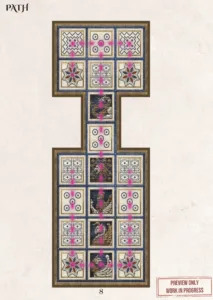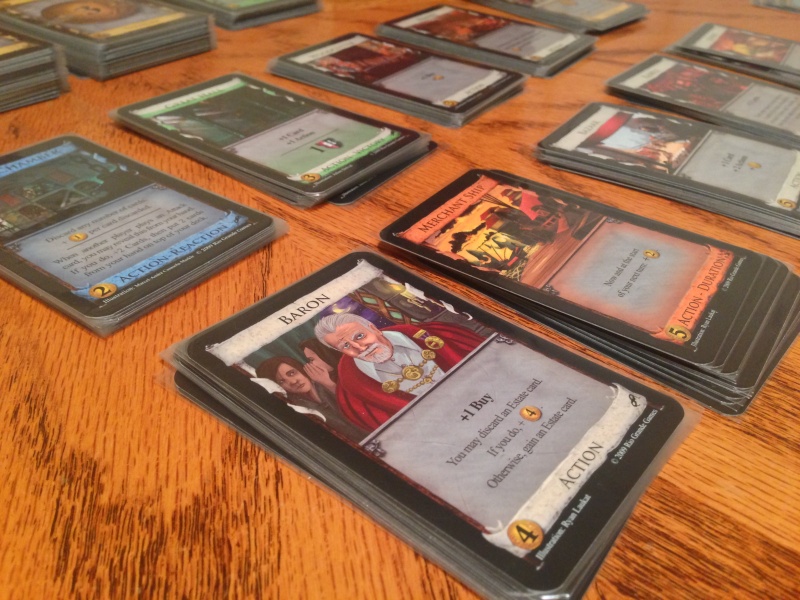Note: This preview uses pre-release components and rules. What you see here may be different from the final, published game. This post was a paid preview; you can find out more information here.
 If you had to guess what the oldest known board game is, you’d probably think it was something like Checkers, Go, or maybe Backgammon. While all good guesses, they are also wrong. The oldest board game on record is The Royal Game of Ur. Found in Iraq in an area that used to be Mesopotamia, historians date this ancient game as far back as 2,400 B.C. It’s a simple roll-and-move game that was apparently wildly popular at the time.
If you had to guess what the oldest known board game is, you’d probably think it was something like Checkers, Go, or maybe Backgammon. While all good guesses, they are also wrong. The oldest board game on record is The Royal Game of Ur. Found in Iraq in an area that used to be Mesopotamia, historians date this ancient game as far back as 2,400 B.C. It’s a simple roll-and-move game that was apparently wildly popular at the time.
Today, publisher Spartan Development seeks to take this historical artifact and give it a more modern-day spin. It’s a two-player game that takes about 30 minutes to play.
Gameplay Overview:
The original Royal Game of Ur was a simple roll-and-move board game. You rolled 4 dice and moved one of your pieces the number of pips rolled. The goal was to be the first to race all 7 of your pieces off the other edge of the board. Easy enough, but not a lot of strategy involved.

In this modern implementation, it’s no longer a race to the finish line. Instead, you are trying to be the first player to capture all 4 of the fort spaces. On a player’s turn they first roll their two dice, and depending on the number and color of pips rolled, they can take one of the following actions:
• Spawn a piece on the Lesser Realm Entrance.
• Move a piece: If you rolled 1 pip, then you can move one piece 1 space. If you rolled 2 pips, you can move one piece 2 spaces or two pieces 1 space.
• Depending on the die result, you may spawn a piece on one of the 3 special spaces.
If you move your piece onto an opponent’s piece, it’s eliminated and returned back to their supply. The board also has a few special spaces that grant additional powers:
Lesser Realm Entrance: You can always spawn here on your turn if it’s empty.
Forts: When you move onto a fort, you can immediately take a second turn. Controlling all 4 forts is how you win the game.
Ishtar: While you control this space, none of your pieces on a fort can be eliminated. You can also spawn here if you roll 2 silver pips.
Marduk: If you roll 2 gold pips, you can spawn here instead of the lesser entrance, which saves you a lot of time spent moving down the board.
Royal Realm: You can spawn on one of these 3 spaces if you roll 2 different colored pips.
Finally, if you control both forts in Heaven, you gain a bonus space of movement when rolling 2 pips. If you control both forts on Earth, you can continue your movement after you eliminate a piece (if you have points remaining).

Gameplay Impressions:
Before I dove into the new gameplay for this game, I was curious what the ancient rules were. It’s definitely a simple game, but it wasn’t as bad as I expected. In fact, it was easy enough that I was able to play with my 5 year olds. Roll the dice, move pieces, and try to be the first to clear all 7 of your tokens. That being said, the game also isn’t something I’d hanker to play again any time soon. I suppose if I was living in ancient Mesopotamia, my entertainment choices were probably a bit limited. It’d be another 5 millennia before I could stream episodes of LOST to pass the time.
The goal of this modern implementation was to take the core of the gameplay of the Royal Game of Ur and give it a bit more strategy and tactics. And on that front, I’d say they succeeded. Instead of a quick race, you actually have decisions to make. Depending on what you roll, you may either spawn a new piece at the lesser entrance, or possibly one of the prime real estate entrances, or even just move pieces. Since this isn’t a simple race, you need to decide what’s the best option on your turn.

In fact, when moving a piece, you need to keep an eye on your opponent’s pieces on the board. Since you know they will be able to move 1 or 2 spaces, where you decide to stop can be pretty important. This is especially true once you get near the Heaven forts. Unless you are lucky enough to spawn in Marduk, you are looking at 7 or so turns to make your way around the board to heaven’s forts. Note: there is a path of movement you have to make around the board, see the photo to the right. If you can eliminate a piece your opponent has spent time moving all the way to heaven, then you’ll have gained a nice advantage.
The only gripe we had with the game is that when you have a turn of rolling blanks you are doing pretty much nothing on your turn (especially if the lesser realm already has a piece on it.) Granted this was a flaw in the original game as well, so perhaps it falls into the “feature not a bug” category. Personally, I wish there was a little tweaking here to eliminate those downturns where an unlucky roll kind of wastes time.

Final Thoughts:
Overall we found this new version of The Royal Game of Ur to be a nice deviation from the centuries-old game. It adds a bit more complexity to the gameplay for those who want a meatier experience. The production values of our prototype copy were also really nice. Mind you it’s not made of wood, inlaid shells, and lapis lazuli like the ancient game, but that’s probably a large ask for a modern-day publisher. But as a nice bonus, you can play the original Royal Game of Ur with the board and components if you want to see what the hubbub was all about 5 millennia ago.
The Royal Game of Ur will be coming soon to Kickstarter early next year. If you are a fan of abstract strategy games, be sure to check out their campaign page once it is launched. You can follow their campaign page here.






















